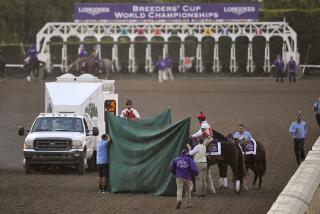Stable Owner Charged in Candy Heiress Brach’s Death : Crime: The widow disappeared 17 years ago. The suspect is one of 23 indicted in U.S. probe of insurance fraud and confidence schemes.
- Share via
CHICAGO — It has been 17 years since 65-year-old candy heiress Helen Vorhees Brach disappeared, leaving behind a $17-million estate, an empty stone manor in an exclusive Chicago suburb and a mystery over the fate of a lonely widow with a weakness for sleek horses and suave gentlemen.
On Wednesday, a team of federal and state investigators said they have solved much of the mystery, outlining a case of murder that seems cast from a Dick Francis suspense novel, populated with high-society rogues and schemes involving fraudulent sales and brutal killings of rare-breed show horses.
Brach was last seen after finishing a regular medical checkup at the Mayo Clinic in Rochester, Minn., on Feb. 17, 1977. As her case grew cold, she was declared legally dead by a Cook County court and her fortune was divided up, left mostly to a charitable trust. A grainy final photograph of Brach, distributed over and over by desperate law enforcement authorities, was all that remained of a privileged life.
In announcing Wednesday the indictment and arrest of Richard J. Bailey, 62, an affluent stable owner, federal prosecutors in Chicago said Brach had been murdered after she had become suspicious that Bailey had swindled her out of hundreds of thousands of dollars in fraudulent horse-buying deals. Bailey was held on charges of conspiring to murder Brach and on 28 other counts ranging from money-laundering to racketeering.
Bailey arranged Brach’s killing but did not commit the crime, said James B. Burns, U.S. attorney for the northern district of Illinois. He declined to say whether investigators know who killed her.
Bailey, who once sold Brach several thoroughbred horses for $300,000, was one of 23 people indicted Wednesday as part of a sweeping federal investigation into insurance fraud and confidence schemes in the upper echelons of the national show-horse circuit.
Indicted along with Bailey were several prominent stable owners, equestrian riders, horse trainers and workers ranging from veterinarians to stable hands. Prosecutors said 19 of the suspects participated directly or indirectly in the execution of at least 15 show horses whose deaths were portrayed to insurance firms as accidental. Bailey was not charged in the horse deaths.
Some animals were drugged. Others were bludgeoned to death. At least three, prosecutors said, were burned alive in their stables.
“It was the dirty little secret of the industry and now it’s coming out of the closet,” said Assistant U.S. Atty. Steven Miller, one of the prosecutors in the case.
The horse show circuit thrives on a patrician audience, and some of its owners are among the nation’s wealthiest families. The circuit stretches from popular venues in bluegrass towns like Raleigh, N.C., and Lexington, Ky., to wintertime haunts in South Florida and Southern California.
“It’s an exclusive sport for an exclusive group of people,” said Terry McVey, president of Equine Adjusters Inc., which investigates insurance claims in the equestrian business.
The centerpiece of the investigation, authorities said, is the plot to murder Brach, which involved Bailey and at least one other man among four defendants named in a string of extensive Chicago-area fraud schemes.
Federal authorities declined to disclose much of the details of Brach’s murder and would not even say if they know where her body lies. But they alleged that Brach and 12 other wealthy women--and perhaps many more--were victims of Bailey’s honeyed scams, each launched in the personal advertisement sections of local newspapers in Chicago’s wealthy North Shore suburbs.
Advertising as a horse breeder with expensive tastes, Bailey allegedly met and then wined and dined his victims, eventually persuading them to lend him money or put up tens of thousands of dollars for purchases of show horses. Most of the purchases were fraudulent, authorities said. The scams continued until “he got enough or they caught on,” Miller said.
Burns said Bailey “broke his way into their lives and hearts by telling them that he loved them and wanted to marry them.”
Many were “victims who were alone in life due to the death of a spouse or divorce,” Burns said. Brach, originally a country club hostess from Miami, retreated to her 18-room mansion after the death of her husband, candy executive Frank Brach, in 1970.
After her disappearance, police centered their suspicions on Jack Matlick, Brach’s chauffeur and houseman, who claimed that he was the last to see her alive, when he drove her to O’Hare International Airport for a vacation flight to Florida.
But on Wednesday, prosecutors declined to name Matlick or any other suspect besides Bailey in Brach’s murder.
“You’ll just have to wait for the trial,” Miller said.
More to Read
Sign up for Essential California
The most important California stories and recommendations in your inbox every morning.
You may occasionally receive promotional content from the Los Angeles Times.










